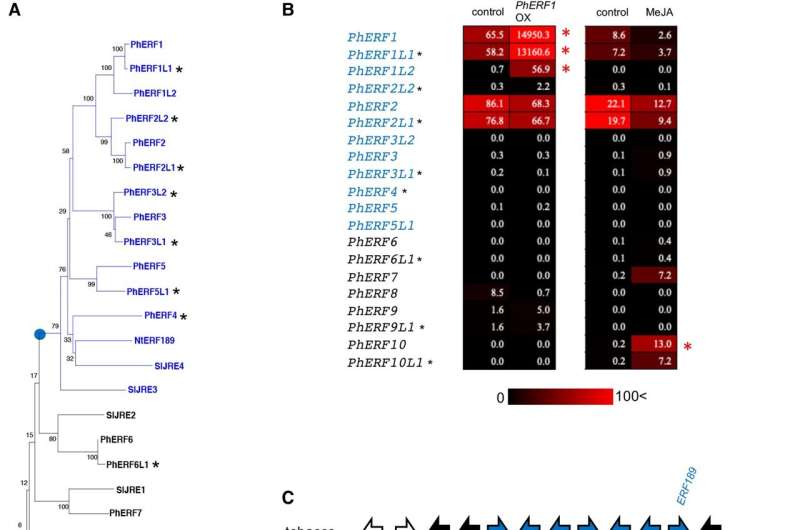This article has been reviewed according to Science X's editorial process and policies. Editors have highlighted the following attributes while ensuring the content's credibility:
fact-checked
peer-reviewed publication
proofread
Induced production of specialized steroids by transcriptional reprogramming in Petunia hybrida

Plants produce a dizzying array of chemical compounds known as secondary metabolites, which help them flourish under fluctuating environmental conditions. Some of these metabolites defend against insect attack, while others help plants communicate, time life cycle events, or attract pollinators, among other functions.
Humanity has long taken advantage of these bioactive natural products, using them as medicine, flavorings, dyes, perfumes, and even industrial materials. Production of secondary metabolites is typically controlled by transcription factors.
Tsubasa Shoji and colleagues sought to identify unexplored secondary metabolites by manipulating these upstream regulators in the petunia (Petunia hybrida), an ornamental flowering plant known for its easy care and vivid colored blooms.
The team's research is published in PNAS Nexus.
The team identified a group of transcription factors in the petunia, which they dub PhERF genes (The "Ph" comes from the scientific name Petunia hybrida and ERF denotes the transcription factor family it belongs to, the ethylene response factor family.) Transiently overexpressing PhERF1 in petunia leaves led to the production of specialized steroids, the petuniolides and petuniasterones, which are likely involved in plant defense.
There are similar ERF transcription factors in many plants families, and using evolutionarily conserved factors as genetic tools to stimulate the production of bioactive natural products has significant potential for bioproduction, according to the authors.
More information: Tsubasa Shoji et al, Induced production of specialized steroids by transcriptional reprogramming in Petunia hybrida, PNAS Nexus (2023). DOI: 10.1093/pnasnexus/pgad326 academic.oup.com/pnasnexus/art … 2/10/pgad326/7321481
Journal information: PNAS Nexus
Provided by PNAS Nexus




















